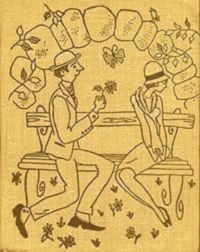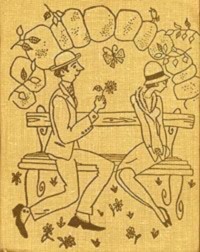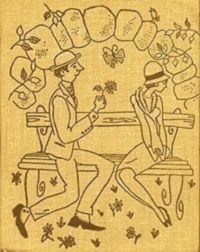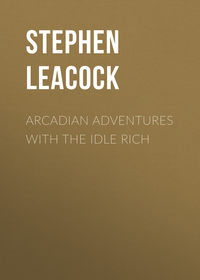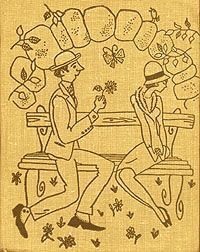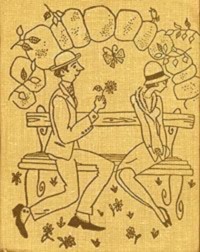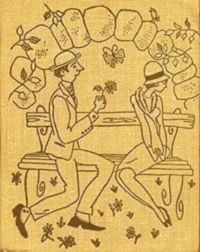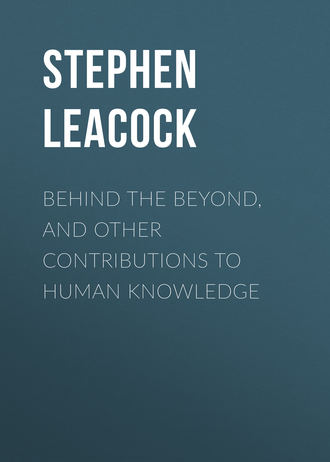 полная версия
полная версияBehind the Beyond, and Other Contributions to Human Knowledge
"And now, John, I want your help, only you can help me, you are so strong—my Jack, I must save him." She looks about the room. Something seems to overcome her. "Oh, John, this place—his being here like this—it seems a judgment on us."
The audience are getting it fast now. And when Mrs. Harding speaks of "our awful moment of folly," "the retribution of our own sins," they grasp it and shiver with the luxury of it.
After that when Mrs. Harding says: "Our wretched boy, we must save him,"—they all know why she says "our."
She goes on more calmly. "I realized. I knew—he is not alone here."
Sir John's voice is quiet, almost hollow. "He is not alone."
"But this woman—can you not deal with her—persuade her—beg her for my sake—bribe her to leave my boy?"
Lady Cicely steps out. "There is no bribe needed. I am going. If I have wronged him, and you, it shall be atoned."
Sir John has given no sign. He is standing stunned. She turns to him. "I have heard and know now. I cannot ask for pity. But when I am gone—when it is over—I want you to give him this letter—and I want you, you two, to—to be as if I had never lived."
She lays the letter in his hand. Then without a sign, Lady Cicely passes out. There is a great stillness in the house. Mrs. Harding has watched Lady Cicely and Sir John in amazement. Sir John has sunk into a chair. She breaks out, "John, for God's sake what does it mean—this woman—speak—there is something awful, I must know."
"Yes, you must know. It is fate. Margaret, you do not know all. Two years ago I married–"
"But this woman, this woman–"
"She is—she was—my wife."
. . . . . .And at this moment Harding breaks into the room. "Cicely, Cicely, I was too late–" He sees the others. "Mother," he says in agony, "and you–" He looks about. "Where is she? What is happening? I must know–"
Sir John, as if following a mechanical impulse, has handed Harding the letter. He tears it open and reads:
"Dearest, I am going away, to die. It cannot be long now. The doctor told me to-day. That was why I couldn't speak or explain it to you and was so strange at supper. But I am glad now. Good-by."
Harding turns upon Sir John with the snarl of a wolf. "What have you done? Why have you driven her away? What right had you to her, you devil? I loved her—She was mine–"
He had seized a pointed knife from the supper table. His shoulders are crouched—he is about to spring on Sir John. Mrs. Harding has thrown herself between them.
"Jack, Jack, you mustn't strike."
"Out of the way, I say, I'll–"
"Jack, Jack, you mustn't strike. Can't you understand? Don't you see—what it is. . . ."
"What do you mean—stand back from me."
"Jack he—is—your—father."
The knife clatters to the floor. "My God!"
And then the curtain falls—and there's a burst of applause and, in accordance with all the best traditions of the stage, one moment later, Lady Cicely and Mr. Harding and Sir John and Mrs. Harding are all bowing and smiling like anything, and even the little French maid sneaks on in a corner of the stage and simpers.
Then the orchestra plays and the leopards sneak out and the people in the boxes are all talking gayly to show that they're not the least affected. And everybody is wondering how it will come out, or rather how it can possibly come out at all, because some of them explain that it's all wrong, and just as they are making it clear that there shouldn't be any third act, the curtain goes up and it's–
Act III. Three Months Later
THE curtain rises on a drawing-room in Mrs. Harding's house in London. Mrs. Harding is sitting at a table. She is sorting out parcels. There is a great air of quiet about the scene. The third act of a problem play always has to be very quiet. It is like a punctured football with the wind going out of it. The play has to just poof itself out noiselessly.
For instance, this is the way it is done.
Does Mrs. Harding start to talk about Lady Cicely and Jack, and Paris? Not a bit. She is simply looking over the parcels and writing names and talking to herself so that the audience can get the names.
"For the Orphans' Home—poor little things. For the Foundlings' Protection Society. For the Lost Infants' Preservation League" (a deep sigh)—"poor, poor children."
Now what is all this about? What has this to do with the play? Why, don't you see that it is the symbol of philanthropy, of gentleness, of melancholy sadness? The storm is over and there is nothing in Mrs. Harding's heart but pity. Don't you see that she is dressed in deeper black than ever, and do you notice that look on her face—that third-act air—that resignation?
Don't you see that the play is really all over? They're just letting the wind out of it.
A man announces "Sir John Trevor."
Sir John steps in. Mrs. Harding goes to meet him with both hands out.
"My dear, dear friend," she says in rich, sad tones.
Sir John is all in black. He is much aged, but very firm and very quiet. You can feel that he's been spending the morning with the committee of the Homeless Newsboys' League or among the Directorate of the Lost Waifs' Encouragement Association. In fact he begins to talk of these things at once. The people who are not used to third acts are wondering what it is all about. The real playgoers know that this is atmosphere.
Then presently–
"Tea?" says Mrs. Harding, "shall I ring?"
"Pray do," says Sir John. He seats himself with great weariness. The full melancholy of the third act is on him. The tea which has been made for three acts is brought in. They drink it and it begins to go to their heads. The "atmosphere" clears off just a little.
"You have news, I know," says Mrs. Harding, "you have seen him?"
"I have seen him."
"And he is gone?"
"Yes, he has sailed," says Sir John. "He went on board last night, only a few hours after my return to London. I saw him off. Poor Jack. Gatherson has been most kind. They will take him into the embassy at Lima. There, please God, he can begin life again. The Peruvian Ambassador has promised to do all in his power."
Sir John sighs deeply and is silent. This to let the fact soak into the audience that Jack has gone to Peru. Any reasonable person would have known it. Where else could he go to?
"He will do well in Peru," says Mrs. Harding. She is imitating a woman being very brave.
"Yes, I trust so," says Sir John. There is silence again. In fact the whole third act is diluted with thirty per cent. of silence. Presently Mrs. Harding speaks again in a low tone.
"You have other news, I know."
"I have other news."
"Of her?"
"Yes. I have been to Switzerland. I have seen the curé—a good man. He has told me all there is to tell. I found him at the hospice, busy with his œuvre de bienfaisance. He led me to her grave."
Sir John is bowed in deep silence.
Lady Cicely dead! Everybody in the theater gasps. Dead! But what an unfair way to kill her! To face an open death on the stage in fair hand to hand acting is one thing, but this new system of dragging off the characters to Switzerland between the acts, and then returning and saying that they are dead is quite another.
Presently Mrs. Harding speaks, very softly. "And you? You will take up your work here again?"
"No; I am going away."
"Going?"
"Yes, far away. I am going to Kafoonistan."
Mrs. Harding looks at him in pain. "To Kafoonistan?"
"Yes. To Kafoonistan. There's work there for me to do."
. . . . . .There is silence again. Then Sir John speaks. "And you? You will settle down here in London?"
"No. I am going away."
"Going away?"
"Yes, back to Balla Walla. I want to be alone. I want to forget. I want to think. I want to try to realize."
"You are going alone?"
"Yes, quite alone. But I shall not feel alone when I get there. The Maharanee will receive me with open arms. And my life will be useful there. The women need me; I will teach them to read, to sew, to sing."
"Mrs. Harding—Margaret—you must not do this. You have sacrificed your life enough—you have the right to live–"
There is emotion in Sir John's tone. It is very rough on him to find his plan of going to Kafoonistan has been outdone by Mrs. Harding's going to Balla Walla. She shakes her head.
"No, no; my life is of no account now. But you, John, you are needed here, the country needs you. Men look to you to lead them."
Mrs. Harding would particularize if she could, but she can't just for the minute remember what it is Sir John can lead them to. Sir John shakes his head.
"No, no; my work lies there in Kafoonistan. There is a man's work to be done there. The tribes are ignorant, uncivilized."
This dialogue goes on for some time. Mrs. Harding keeps shaking her head and saying that Sir John must not go to Kafoonistan, and Sir John says she must not go to Balla Walla. He protests that he wants to work and she claims that she wants to try to think clearly. But it is all a bluff. They are not going. Neither of them. And everybody knows it. Presently Mrs. Harding says:
"You will think of me sometimes?"
"I shall never forget you."
"I'm glad of that."
"Wherever I am, I shall think of you—out there in the deserts, or at night, alone there among the great silent hills with only the stars overhead, I shall think of you. Your face will guide me wherever I am."
He has taken her hand.
"And you," he says, "you will think of me sometimes in Balla Walla?"
"Yes, always. All day while I am with the Maharanee and her women, and at night, the great silent Indian night when all the palace is asleep and there is heard nothing but the sounds of the jungle, the cry of the hyena and the bray of the laughing jackass, I shall seem to hear your voice."
She is much moved. She rises, clenches her hands and then adds, "I have heard it so for five and twenty years."
He has moved to her.
"Margaret!"
"John!"
"I cannot let you go, your life lies here—with me—next my heart—I want your help, your love, here inside the beyond."
And as he speaks and takes her in his arms, the curtain sinks upon them, rises, falls, rises, and then sinks again asbestos and all, and the play is over. The lights are on, the audience rises in a body and puts on its wraps. All over the theater you can hear the words "perfectly rotten," "utterly untrue," and so on. The general judgment seems to be that it is a perfectly rotten play, but very strong.
They are saying this as they surge out in great waves of furs and silks, with black crush hats floating on billows of white wraps among the foam of gossamer scarfs. Through it all is the squawk of the motor horn, the call of the taxi numbers and the inrush of the fresh night air.
But just inside the theater, in the office, is a man in a circus waistcoat adding up dollars with a blue pencil, and he knows that the play is all right.
FAMILIAR INCIDENTS
I.—With the Photographer
"I WANT my photograph taken," I said. The photographer looked at me without enthusiasm. He was a drooping man in a gray suit, with the dim eye of a natural scientist. But there is no need to describe him. Everybody knows what a photographer is like.
"Sit there," he said, "and wait."
I waited an hour. I read the Ladies Companion for 1912, the Girls Magazine for 1902 and the Infants Journal for 1888. I began to see that I had done an unwarrantable thing in breaking in on the privacy of this man's scientific pursuits with a face like mine.
After an hour the photographer opened the inner door.
"Come in," he said severely.
I went into the studio.
"Sit down," said the photographer.
I sat down in a beam of sunlight filtered through a sheet of factory cotton hung against a frosted skylight.
The photographer rolled a machine into the middle of the room and crawled into it from behind.
He was only in it a second,—just time enough for one look at me,—and then he was out again, tearing at the cotton sheet and the window panes with a hooked stick, apparently frantic for light and air.
Then he crawled back into the machine again and drew a little black cloth over himself. This time he was very quiet in there. I knew that he was praying and I kept still.
When the photographer came out at last, he looked very grave and shook his head.
"The face is quite wrong," he said.
"I know," I answered quietly; "I have always known it."
He sighed.
"I think," he said, "the face would be better three-quarters full."
"I'm sure it would," I said enthusiastically, for I was glad to find that the man had such a human side to him. "So would yours. In fact," I continued, "how many faces one sees that are apparently hard, narrow, limited, but the minute you get them three-quarters full they get wide, large, almost boundless in–"
But the photographer had ceased to listen. He came over and took my head in his hands and twisted it sideways. I thought he meant to kiss me, and I closed my eyes.
But I was wrong.
He twisted my face as far as it would go and then stood looking at it.
He sighed again.
"I don't like the head," he said.
Then he went back to the machine and took another look.
"Open the mouth a little," he said.
I started to do so.
"Close it," he added quickly.
Then he looked again.
"The ears are bad," he said; "droop them a little more. Thank you. Now the eyes. Roll them in under the lids. Put the hands on the knees, please, and turn the face just a little upward. Yes, that's better. Now just expand the lungs! So! And hump the neck—that's it—and just contract the waist—ha!—and twist the hip up toward the elbow—now! I still don't quite like the face, it's just a trifle too full, but–"
I swung myself round on the stool.
"Stop," I said with emotion but, I think, with dignity. "This face is my face. It is not yours, it is mine. I've lived with it for forty years and I know its faults. I know it's out of drawing. I know it wasn't made for me, but it's my face, the only one I have—" I was conscious of a break in my voice but I went on—"such as it is, I've learned to love it. And this is my mouth, not yours. These ears are mine, and if your machine is too narrow—" Here I started to rise from the seat.
Snick!
The photographer had pulled a string. The photograph taken. I could see the machine still staggering from the shock.
"I think," said the photographer, pursing his lips in a pleased smile, "that I caught the features just in a moment of animation."
"So!" I said bitingly,—"features, eh? You didn't think I could animate them, I suppose? But let me see the picture."
"Oh, there's nothing to see yet," he said, "I have to develop the negative first. Come back on Saturday and I'll let you see a proof of it."
On Saturday I went back.
The photographer beckoned me in. I thought he seemed quieter and graver than before. I think, too, there was a certain pride in his manner.
He unfolded the proof of a large photograph, and we both looked at it in silence.
"Is it me?" I asked.
"Yes," he said quietly, "it is you," and we went on looking at it.
"The eyes," I said hesitatingly, "don't look very much like mine."
"Oh, no," he answered, "I've retouched them. They come out splendidly, don't they?"
"Fine," I said, "but surely my eyebrows are not like that?"
"No," said the photographer, with a momentary glance at my face, "the eyebrows are removed. We have a process now—the Delphide—for putting in new ones. You'll notice here where we've applied it to carry the hair away from the brow. I don't like the hair low on the skull."
"Oh, you don't, don't you?" I said.
"No," he went on, "I don't care for it. I like to get the hair clear back to the superficies and make out a new brow line."
"What about the mouth?" I said with a bitterness that was lost on the photographer; "is that mine?"
"It's adjusted a little," he said, "yours is too low. I found I couldn't use it."
"The ears, though," I said, "strike me as a good likeness; they're just like mine."
"Yes," said the photographer thoughtfully, "that's so; but I can fix that all right in the print. We have a process now—the Sulphide—for removing the ears entirely. I'll see if–"
"Listen!" I interrupted, drawing myself up and animating my features to their full extent and speaking with a withering scorn that should have blasted the man on the spot. "Listen! I came here for a photograph—a picture—something which (mad though it seems) would have looked like me. I wanted something that would depict my face as Heaven gave it to me, humble though the gift may have been. I wanted something that my friends might keep after my death, to reconcile them to my loss. It seems that I was mistaken. What I wanted is no longer done. Go on, then, with your brutal work. Take your negative, or whatever it is you call it,—dip it in sulphide, bromide, oxide, cowhide,—anything you like,—remove the eyes, correct the mouth, adjust the face, restore the lips, reanimate the necktie and reconstruct the waistcoat. Coat it with an inch of gloss, shade it, emboss it, gild it, till even you acknowledge that it is finished. Then when you have done all that—keep it for yourself and your friends. They may value it. To me it is but a worthless bauble."
I broke into tears and left.
II.—The Dentist and the Gas
"I THINK," said the dentist, stepping outside again, "I'd better give you gas."
Then he moved aside and hummed an air from a light opera while he mixed up cement.
I sat up in my shroud.
"Gas!" I said.
"Yes," he repeated, "gas, or else ether or a sulphuric anesthetic, or else beat you into insensibility with a club, or give you three thousand bolts of electricity."
These may not have been his exact words. But they convey the feeling of them very nicely.
I could see the light of primitive criminality shining behind the man's spectacles.
And to think that this was my fault—the result of my own reckless neglect. I had grown so used to sitting back dozing in my shroud in the dentist's chair, listening to the twittering of the birds outside, my eyes closed in the sweet half sleep of perfect security, that the old apprehensiveness and mental agony had practically all gone.
He didn't hurt me, and I knew it.
I had grown—I know it sounds mad—almost to like him.
For a time I had kept up the appearance of being hurt every few minutes, just as a precaution. Then even that had ceased and I had dropped into vainglorious apathy.
It was this, of course, which had infuriated the dentist. He meant to reassert his power. He knew that nothing but gas could rouse me out of my lethargy and he meant to apply it—either gas or some other powerful pain stimulant.
So, as soon as he said "gas," my senses were alert in a moment.
"When are you going to do it?" I said in horror.
"Right now, if you like," he answered.
His eyes were glittering with what the Germans call Blutlust. All dentists have it.
I could see that if I took my eye off him for a moment he might spring at me, gas in hand, and throttle me.
"No, not now, I can't stay now," I said, "I have an appointment, a whole lot of appointments, urgent ones, the most urgent I ever had." I was unfastening my shroud as I spoke.
"Well, then, to-morrow," said the dentist.
"No," I said, "to-morrow is Saturday. And Saturday is a day when I simply can't take gas. If I take gas, even the least bit of gas on a Saturday, I find it's misunderstood–"
"Monday then."
"Monday, I'm afraid, won't do. It's a bad day for me—worse than I can explain."
"Tuesday?" said the dentist.
"Not Tuesday," I answered. "Tuesday is the worst day of all. On Tuesday my church society meets, and I must go to it."
I hadn't been near it, in reality, for three years, but suddenly I felt a longing to attend it.
"On Wednesday," I went on, speaking hurriedly and wildly, "I have another appointment, a swimming club, and on Thursday two appointments, a choral society and a funeral. On Friday I have another funeral. Saturday is market day. Sunday is washing day. Monday is drying day–"
"Hold on," said the dentist, speaking very firmly. "You come to-morrow morning: I'll write the engagement for ten o'clock."
I think it must have been hypnotism.
Before I knew it, I had said "Yes."
I went out.
On the street I met a man I knew.
"Have you ever taken gas from a dentist?" I asked.
"Oh, yes," he said; "it's nothing."
Soon after I met another man.
"Have you ever taken gas?" I asked.
"Oh, certainly," he answered, "it's nothing, nothing at all."
Altogether I asked about fifty people that day about gas, and they all said that it was absolutely nothing. When I said that I was to take it to-morrow, they showed no concern whatever. I looked in their faces for traces of anxiety. There weren't any. They all said that it wouldn't hurt me, that it was nothing.
So then I was glad because I knew that gas was nothing.
It began to seem hardly worth while to keep the appointment. Why go all the way downtown for such a mere nothing?
But I did go.
I kept the appointment.
What followed was such an absolute nothing that I shouldn't bother to relate it except for the sake of my friends.
The dentist was there with two assistants. All three had white coats on, as rigid as naval uniforms.
I forget whether they carried revolvers.
Nothing could exceed their quiet courage. Let me pay them that tribute.
I was laid out in my shroud in a long chair and tied down to it (I think I was tied down; perhaps I was fastened with nails). This part of it was a mere nothing. It simply felt like being tied down by three strong men armed with pinchers.
After that a gas tank and a pump were placed beside me and a set of rubber tubes fastened tight over my mouth and nose. Even those who have never taken gas can realize how ridiculously simple this is.
Then they began pumping in gas. The sensation of this part of it I cannot, unfortunately, recall. It happened that just as they began to administer the gas, I fell asleep. I don't quite know why. Perhaps I was overtired. Perhaps it was the simple home charm of the surroundings, the soft drowsy hum of the gas pump, the twittering of the dentists in the trees—did I say the trees? No; of course they weren't in the trees—imagine dentists in the trees—ha! ha! Here, take off this gaspipe from my face till I laugh—really I just want to laugh—only to laugh–
Well,—that's what it felt like.
Meanwhile they were operating.
Of course I didn't feel it. All I felt was that someone dealt me a powerful blow in the face with a sledgehammer. After that somebody took a pickax and cracked in my jaw with it. That was all.
It was a mere nothing. I felt at the time that a man who objects to a few taps on the face with a pickax is overcritical.
I didn't happen to wake up till they had practically finished. So I really missed the whole thing.
The assistants had gone, and the dentist was mixing up cement and humming airs from light opera just like old times. It made the world seem a bright place.
I went home with no teeth. I only meant them to remove one, but I realized that they had taken them all out. Still it didn't matter.
Not long after I received my bill. I was astounded at the nerve of it! For administering gas, debtor, so much; for removing teeth, debtor, so much;—and so on.
In return I sent in my bill:
Dr. William Jaws
DEBTOR

My bill has been contested and is in the hands of a solicitor. The matter will prove, I understand, a test case and will go to the final courts. If the judges have toothache during the trial, I shall win.
III.—My Lost Opportunities
THE other day I took a walk with a real estate man. Out in the suburbs he leaned over the wooden fence of an empty lot and waved his hand at it.



